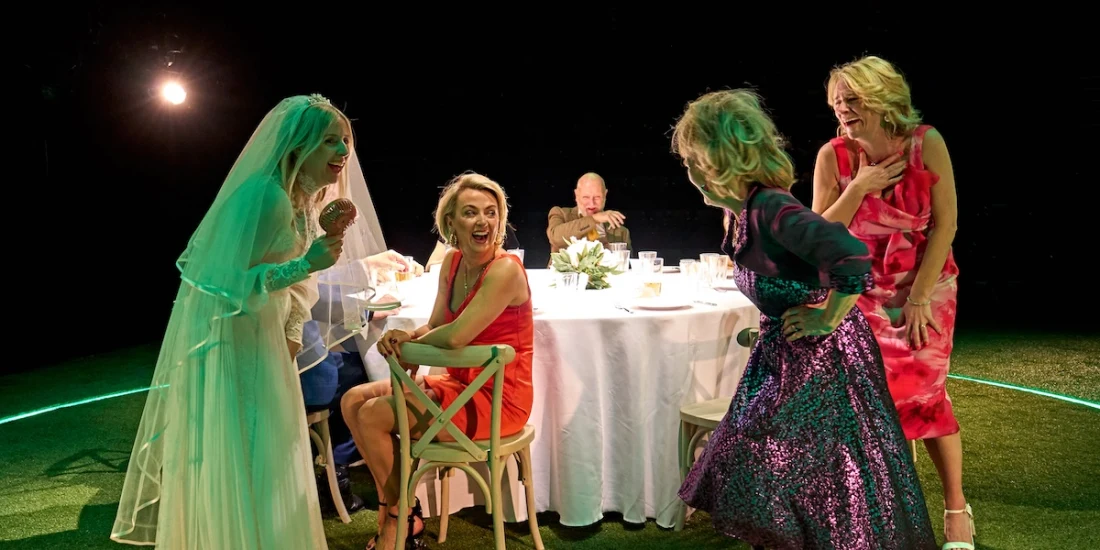'Till the Stars Come Down' review – this hilarious, heart-stopping family saga makes an early bid for play of the year
Read our five-star review of Beth Steel's Till the Stars Come Down, now in performances at the National Theatre to 16 March.
Beth Steel makes an early bid for play of the year with the properly funny, fiercely loving and piercingly perceptive Till the Stars Come Down. It’s a state-of-the-nation drama told through the prism of one family, and a generational tale boiled down to one day; brilliantly specific in its references, yet universal in its hilarious, heart-stopping storytelling.
It’s Sylvia’s wedding day, an event that brings her whole working-class family together. That includes her sisters: party-girl Maggie, who recently skipped town, and the resentfully responsible Hazel, the sole provider for two children now that husband John is out of work.
There’s also Aunty Carol and her husband Pete, who is in a three-decades-long feud with his brother Tony. The latter is bereft at Sylvia leaving – and there’s suspicion from the family around her husband-to-be, the hard-working Polish immigrant Marek.
Steel returns here to her hometown of Mansfield, in Nottinghamshire, and the glorious result is a play shot through with authenticity and affection. The opening getting-ready scene, brimming with curlers, hair straighteners, lip liner and buck’s fizz, is a brilliant blend of female solidarity and bubbling resentments, spread across three generations.
The dialogue is crammed with stupendous one-liners. Maggie fondly remembers an ex who would look at her “like I was a potato in a famine”. Hazel labels next door’s new hot tub a “sex pond”.
The phenomenal Lorraine Ashbourne, as Aunty Carol, gets the very best gags – and delivers them with lip-smacking relish. “Every time I eat a crumpet, I miss Kilroy,” she sighs; later, after throwing some shapes to “Toxic”, and then vomiting behind a chair, she announces proudly “I’ve spewed”. On encountering a tense moment, she quips “Someone needs a Happy Meal”. If there’s a funnier performance this year, I’ll be very surprised.
Sinead Matthews is heartrending as optimistic bride Sylvia, who fantasises about stopping time – partly due to grief for her mum (lost suddenly to cancer; failed by the NHS), partly, perhaps, because she can, like us, sense the storm coming. The past haunts the action in many ways, most potently the miners’ strike and pit closures that changed the community forever.
Now immigration is the sticking point in this Red Wall town. Hazel’s ugly prejudices come out in a series of nasty quips about Eastern Europeans taking all the jobs, contributing to an explosive event at the wedding. Lucy Black does thoughtful work to show the terror and loneliness underneath that behaviour, without ever excusing it.
Marc Wootton’s Marek isn’t just a saintly victim either. Although often a cuddly bear of a man (he serenades Sylvia with “Can’t Take My Eyes Off You”, with new lyrics – she’s the yogurt to his spoon), he forthrightly tells his new English relations that they can’t keep crying victim.
Lisa McGrillis conveys a terrible longing for the man she can’t have, Ruby Stokes is spot-on as the angst-ridden teen, and I saw the show-stealing Cadence Williams as the loudly demanding young Sarah. Everyone gets their moment: Alan Williams’s gruff widower trotting out his Tarzan impression; Derek Riddell’s John admitting the depth of his unhappiness; Philip Whitechurch’s Pete reciting all the lost pits in a spellbinding incantation.
Bijan Sheibani gives this intimate piece dynamism via a buoyant in-the-round staging – the characters revolving around a disco ball like planets in the solar system (Sarah is a budding astronaut). Samal Blak’s detailed design runs from Carol’s giant purple hat to a buffet that includes a cheese hedgehog, while Paule Constable’s lighting aids the constantly shifting tone. The ending skews too soap operatic though, and Sheibani merely heightens it.
Above all is the Chekhovian notion of whether we should welcome or fear change; stay close to home and family, or seek new adventures. It’s a big, existential question for an entire nation – but in Steel’s exquisitely empathetic work, it feels extremely personal, and just as important for that. Magnificent theatre.
Till the Stars Come Down is at the National Theatre through 16 March.
Photo credit: Till the Stars Come Down (Photo by Manuel Harlan)
Originally published on
